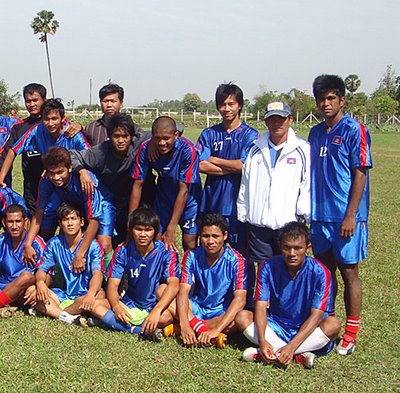On borrowed time?
 Another excuse to post this picture of a beautiful tiger at Tek Chhou Zoo; okay so its not in the wild but at least we get the chance to see this magnificent animal
Another excuse to post this picture of a beautiful tiger at Tek Chhou Zoo; okay so its not in the wild but at least we get the chance to see this magnificent animalCambodia - Temples, Books, Films and ruminations...
 Another excuse to post this picture of a beautiful tiger at Tek Chhou Zoo; okay so its not in the wild but at least we get the chance to see this magnificent animal
Another excuse to post this picture of a beautiful tiger at Tek Chhou Zoo; okay so its not in the wild but at least we get the chance to see this magnificent animal Titanic Unveiling on Top of Angkor Wat
Titanic Unveiling on Top of Angkor Wat
Balanced precariously atop a metal scaffold 20 stories above the Cambodian jungle, publisher Kent Davis has recently unveiled Angkor The Magnificent, an expanded edition of Helen Churchill Candee's 1924 Asian travel classic featuring the first published biography of the 20th century adventuress. "It's astounding to think of ancient Khmer stonemasons experiencing this view 1,000 years ago. This is the type of travel adventure Helen Churchill Candee lived for...her spirit is certainly here today!" said Davis at the top of the temple's central tower on a temporary metal framework erected for restoration of the complex pinecone-shaped structure.
Davis held the ceremony at Angkor Wat before donating copies of the book to Cambodia's key libraries including the Biblioteque Nationale, the Center for Khmer Studies, the Khmer Arts Academy and L'Ecole francaise d'Extreme-Orient. "Angkor Wat is one of the most magical places on earth. Candee's travelogue vividly portrays an Angkor of yesteryear for those looking for insights into these truly magnificent Cambodian ruins" comments Yale archeology professor Dr. Dougald O'Reilly who founded Heritage Watch to preserve Cambodia's heritage. This historic release marks the first time in 85 years that readers can enjoy Candee's evocative descriptions of Asian adventure travel in the land of the lost Khmer civilization. Today, Helen Candee is still the perfect guide to bring the temples to life...for visitors experiencing these wonders in person or from their reading chairs. Angkor the Magnificent is available on Amazon.com in the US and Europe.
The book is produced by DatAsia Press which publishes books focusing on Cambodia and Southeast Asian history. As a researcher with Devata.org, Kent Davis works to document the importance of women in Asian history and to decode the meaning of the 1,780 apsara (female goddess) portrait carvings found Angkor Wat. Dr. Dougald O'Reilly is an author, archaeologist and Yale University professor specializing in prehistoric Southeast Asia. He is committed to preserving Cambodia's cultural heritage and founded Heritage Watch, a non-profit organization working to preserve cultural icons and stop antiquity theft in Cambodia. To read my earlier review of the book, click here.
Labels: Angkor, Kent Davis
Labels: Tim Page
There was a special reason for the timing of this trip to Cambodia, one you won’t read about in my columns: My family has built a junior high school in Cambodia, and we just had the opening ceremony. We timed it for the Christmas vacation, so our three kids — aged 11 through 16 — could see it. Oh, yes, and so that they could see kids who are desperately eager to get an education. I’ve been visiting Cambodia for the last dozen years and have been particularly moved by the horrific sex trafficking here. One of the antidotes to prevent trafficking is education, and Cambodia is desperately short of schools. A couple of years ago I wrote about a school in Seattle that had funded a school in Cambodia through American Assistance for Cambodia. I was impressed with the organization and the way it gets extra bang for the buck through matching funds from the Asian Development Bank and the World Bank. Moreover, in some countries, you build a school and have a nice new building, but the teachers never show up. That’s much less of a problem in Cambodia, where one of the bottlenecks truly is school buildings. So my wife, Sheryl, and I talked it over and decided to start our own school. We had just received an advance for a book about women in the developing world — “Half the Sky,” coming out this fall! — and it seemed only appropriate to use the money to support girls in a poor country. And we also wanted to show our kids a glimpse of need abroad and the way education can transform people’s lives.
Our school is a middle school a couple of hours east of Phnom Penh, and it was finally finished this month. So Sheryl and I and the kids came here as a family trip, all five of us, and participated in the school-opening ceremony. It was quite an event: Buddhist monks opened it, the deputy governor spoke, and each member of our family spoke briefly. There were about 1,000 people attending, mostly students and their parents, and they got a real kick out of seeing my kids speak. American Assistance for Cambodia is the brainchild of Bernie Krisher, a former news magazine correspondent who in 1993 started it as an aid group to support Cambodia. He has built 400 schools around the country, as well as health programs and projects to fight sex trafficking. He also publishes the Cambodia Daily, an English-language paper, and even persuaded J.K. Rowling to donate Khmer-language rights to “Harry Potter,” so that cheap Harry Potter books could encourage Cambodian children to start reading. Bernie is truly an extraordinary figure who is having a far-reaching impact on the people of Cambodia, and I’m just proud to know him.
If anyone out there wants to volunteer to teach English in the Cambodian countryside, the principal of our school said he would welcome an American teacher. He said the village would put the teacher up either at the Buddhist pagoda or in a local person’s home. If you’re interested, contact American Assistance for Cambodia to be put in touch with the principal. Of course, there are lots of other ways to help Cambodia. I met a woman volunteering at teaching English to children at the garbage dump in Phnom Penh; she loves it and finds new meaning in the project. The organization is A New Day Cambodia, run by a Chicago couple and getting rave reviews all around. (There are fewer children at the dump now than when I last visited in 2004, and one reason is the New Day school.) And I had lunch with Alan Lightman, an MIT professor who on the side runs Harpswell Foundation (and who I've featured a few times on this blog), which provides a free dormitory and leadership training for young Cambodian women who otherwise would not be able to attend university. In my speech to the new school, I told the kids that I sometimes wondered why America was so rich and Cambodia was so poor. It’s not because Americans are smarter or more industrious than Cambodians, because Cambodians are sharp as a whistle and incredibly hard-working. One of the factors, I believe, is the educational gap, and we’re just so pleased to do our part to reduce that gap.
Labels: Schools
Labels: Ream
Labels: Steel Pulse, Tim Page
Labels: Ream
Labels: Gabbidon, Leonie Moore
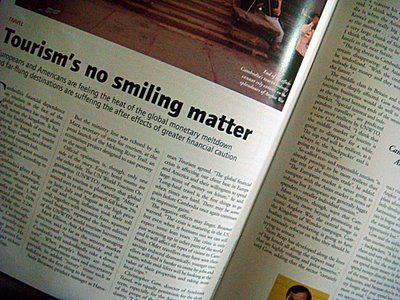 The December edition of the glossy Southeastern Globe magazine has a two page article on tourism in Cambodia written by Sam Campbell and contains contributions from myself. The article takes a look at the current situation in light of the monetary worries elsewhere around the globe and here are some extracts:
The December edition of the glossy Southeastern Globe magazine has a two page article on tourism in Cambodia written by Sam Campbell and contains contributions from myself. The article takes a look at the current situation in light of the monetary worries elsewhere around the globe and here are some extracts:Labels: DC Cam, S-21, Tuol Sleng
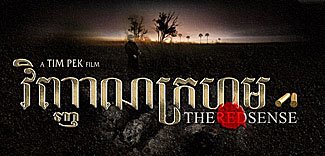 It kicks off later today - the 2nd annual film and video CamboFest. It's taking place in Siem Reap and will feature a host of international shorts, animations and feature-length films from around the globe over four days, from the 26th to the 29th December. The Cambodia-linked films on show are as follows:
It kicks off later today - the 2nd annual film and video CamboFest. It's taking place in Siem Reap and will feature a host of international shorts, animations and feature-length films from around the globe over four days, from the 26th to the 29th December. The Cambodia-linked films on show are as follows: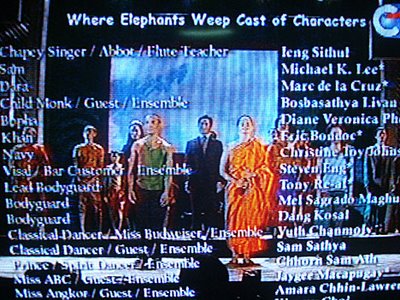 The cast take their bow as the list of characters comes on screen
The cast take their bow as the list of characters comes on screenStafford, on a family trip to the area, traveled to Siem Reap City. There, he heard a performance of the moribund music played from an ancient instrument he had seen carved in bas relief on the walls of Bayon, one of the main temples of Angkor Wat. The instrument is called the Kse Diev, meaning one string. You pluck harmonics on it, moving it on and off one's chest. Some of the last generation of surviving players were nearly all wiped out by the Khmer Rouge. Stafford's fascination with the music, along with his training, impelled him to quench his curiosity as to the music's current status, leading him to the discovery of the fragile nature of its existence. He quickly found that precious little of it had ever been recorded. Stafford raised funds to found Studio CLA (Cambodia Living Arts), a nonprofit ethnographic audio visual production studio with the goal of archiving Cambodia's endangered musical traditions, training local engineers in audio and visual production arts, and providing a laboratory for new creative and collaborative works.
CLA has now has four self-produced CD's for sale in Cambodia. The recent underground documentary, "Sleepwalking through the Mekong," is based on a Los Angeles and Long Beach band's pilgrimage to Cambodia to record in Stafford's studio and to collaborate with traditional CLA artists. Stafford has plenty of in-country support for the collaborative project. Most noteworthy are Arn Chorn-Pond and Sophy Him, whom he met in February 2002, during his first trip to Cambodia. Arn Chorn, by playing revolutionary songs on the flute, survived the horrors of the Khmer Rouge regime that turned him into a child soldier. Today, he is an internationally recognized human rights leader, a recipient among other honors, of the Anne Frank Memorial Award and is the subject of the award winning documentary: "The Flute Player."
Sophy Him, a composer, is a professor of music and fine arts at the Royal Academy of Cambodia in Phnom Penh. Stafford, in support of Him's work, has been part of the creative team supplying additional music and direction for "Where Elephants Weep," the first-known contemporary Cambodian rock opera with a mission to stir young Cambodians to honor their heritage within the context of the changing global society and to inspire them to learn more about Cambodia's performing living arts. The opera had its world premiere in Cambodia this year.
Last but not least from Cambodian Living Arts comes this appeal to raise money for the schooling of one of their best students, Srey Peu, who is in danger of not completing her studies after her sponsor pulled out. Read about Srey Peu, one of the most promising students in the CLA stable here and their efforts to raise $3,500.
Labels: Chi Phat
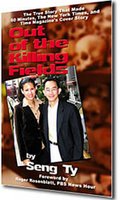 I've been a bit light on new books about Cambodia in recent weeks as nothing has come within earshot, either in the throes of being published or in the near-completion stage except a survivor memoir by Seng Ty. His book should be out sometime next year and will tell his story of surviving the Khmer Rouge years whilst his mother and brothers died of starvation and his father was murdered. Out of the Killing Fields is being co-authored with Michael Jan Friedman and will go onto tell how he was adopted by a family in Massachusetts in 1982 from one of the border camps. His story was featured in a book called Children of War by Roger Rosenblatt in 1983 and in 1999 he was persuaded to film his return to the village of Tuk Cho where his parents both died, for the American CBS 60 Minutes programme. Today Seng is a schools guidance counsellor and lives with his family in Lowell.
I've been a bit light on new books about Cambodia in recent weeks as nothing has come within earshot, either in the throes of being published or in the near-completion stage except a survivor memoir by Seng Ty. His book should be out sometime next year and will tell his story of surviving the Khmer Rouge years whilst his mother and brothers died of starvation and his father was murdered. Out of the Killing Fields is being co-authored with Michael Jan Friedman and will go onto tell how he was adopted by a family in Massachusetts in 1982 from one of the border camps. His story was featured in a book called Children of War by Roger Rosenblatt in 1983 and in 1999 he was persuaded to film his return to the village of Tuk Cho where his parents both died, for the American CBS 60 Minutes programme. Today Seng is a schools guidance counsellor and lives with his family in Lowell.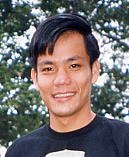 I received an email yesterday from a pal in England telling me that a close friend of hers, and "one of the good guys," had been murdered in Kompong Thom earlier this week. In the English-language press here the story appeared today that local Fisheries official Ek Heng, described as "a very gentle man," had been hacked to death with a meat cleaver in his office around lunchtime on Monday. A very sad loss indeed and one which immediately brought to mind my own great friend, Sok Thea, who passed away in late 2000, aged just 29 and way before it was his time to go. Thea (pictured right) was a visionary, ahead of his time, streets ahead of his rivals in the field of adventure tourism and an enthusiastic fan of ancient Khmer architecture and culture. He possessed boundless energy and was a real friend but he couldn't live with his personal demons and took his own life. Even now I find it hard to talk about him without feeling an overwhelming sense of loss. As I was thinking about him, by pure coincidence, I received a skype message from his brother Sam in Siem Reap and then another close friend of both Thea and myself, Phalla who is now working in Laos, also skyped me. It was good to talk to them both and to recall some of the happy memories we shared with Thea, who none of us will ever forget.
I received an email yesterday from a pal in England telling me that a close friend of hers, and "one of the good guys," had been murdered in Kompong Thom earlier this week. In the English-language press here the story appeared today that local Fisheries official Ek Heng, described as "a very gentle man," had been hacked to death with a meat cleaver in his office around lunchtime on Monday. A very sad loss indeed and one which immediately brought to mind my own great friend, Sok Thea, who passed away in late 2000, aged just 29 and way before it was his time to go. Thea (pictured right) was a visionary, ahead of his time, streets ahead of his rivals in the field of adventure tourism and an enthusiastic fan of ancient Khmer architecture and culture. He possessed boundless energy and was a real friend but he couldn't live with his personal demons and took his own life. Even now I find it hard to talk about him without feeling an overwhelming sense of loss. As I was thinking about him, by pure coincidence, I received a skype message from his brother Sam in Siem Reap and then another close friend of both Thea and myself, Phalla who is now working in Laos, also skyped me. It was good to talk to them both and to recall some of the happy memories we shared with Thea, who none of us will ever forget.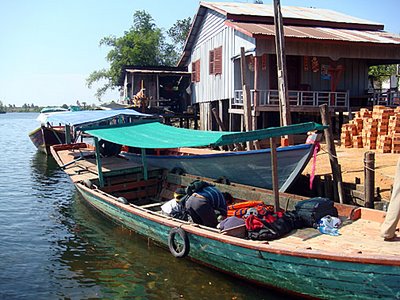 The jetty at Chi Phat village, at the time of our arrival
The jetty at Chi Phat village, at the time of our arrival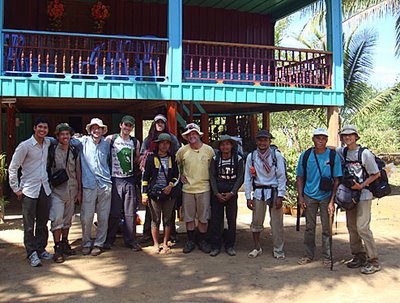 This is our trekking group (guests & guides) at the end of the 2-day hike through the Chi Phat forests. I'm 3rd from left.
This is our trekking group (guests & guides) at the end of the 2-day hike through the Chi Phat forests. I'm 3rd from left. Labels: Cardamoms
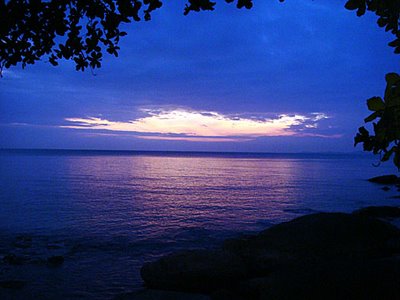 As a reminder, I still have some photos to post from my visit to the south coast a few week ago, this is one taken from Independence Beach in Sihanoukville, more to follow upon my return
As a reminder, I still have some photos to post from my visit to the south coast a few week ago, this is one taken from Independence Beach in Sihanoukville, more to follow upon my returnLabels: Cardamoms, Chi Phat, Sihanoukville
Labels: French colonial, Kampot
Labels: Classical Dance, Sam Savin
Labels: Classical Dance, Sam Savin
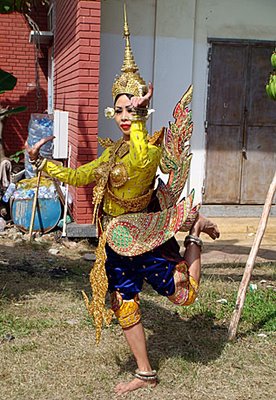 Sam Sathya in full costume practising her art
Sam Sathya in full costume practising her art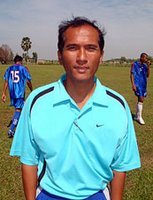 With their record for making changes, I sense a distinct whiff of unhappiness from the Federation's executive committee. Coach Prak Sovannara (pictured) is the only A-listed coach in the country, so he's the best homegrown coach they can have. And he only took over in July. If they feel a change is required, then they will have to look outside Cambodia's borders for a new coach. They've tried it before of course with their previous three coaches namely Joachim Fickert, Scott O'Donnell and a South Korean coach but it didn't work then either.
With their record for making changes, I sense a distinct whiff of unhappiness from the Federation's executive committee. Coach Prak Sovannara (pictured) is the only A-listed coach in the country, so he's the best homegrown coach they can have. And he only took over in July. If they feel a change is required, then they will have to look outside Cambodia's borders for a new coach. They've tried it before of course with their previous three coaches namely Joachim Fickert, Scott O'Donnell and a South Korean coach but it didn't work then either. Christmas wouldn't be Christmas without a Cry No More Annual Farewell Appearance and this year's festive frolics will take place on Saturday 27th December at the Turks Head in the beautiful town of Twickenham (England). Admission, a mere 10 British pounds, is an absolute bargain. The raffle will be drawn by local Rotarian, Neville Niblett and features some stunning prizes including a hat with a little pocket on the side for pencils. It's the kind of thing you can wear round the house or when sailing. I made it myself. It really is something to treasure, the plywood alone cost 15.80 British pounds.
Christmas wouldn't be Christmas without a Cry No More Annual Farewell Appearance and this year's festive frolics will take place on Saturday 27th December at the Turks Head in the beautiful town of Twickenham (England). Admission, a mere 10 British pounds, is an absolute bargain. The raffle will be drawn by local Rotarian, Neville Niblett and features some stunning prizes including a hat with a little pocket on the side for pencils. It's the kind of thing you can wear round the house or when sailing. I made it myself. It really is something to treasure, the plywood alone cost 15.80 British pounds.Labels: Cry No More, Roy Hill
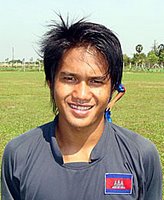 If that's the case, then his performances are more exciting than I first thought. The fresh-faced teenager has played out of his skin in both games and half a dozen saves in the second match against Indonesia showed the hallmark of an excellent stopper, saving with his feet, his hands and his body. Despite his small stature and fragility against the bigger-built strikers he regularly faces, Seiha (right) is an agile and athletic goalkeeper with a penchant for coming for crosses and punching anything he can get his hands to, though he came unstuck for the first goal against Singapore, when this tactic backfired. Nevertheless, he is as brave as a lion and though he spends more time on the floor injured than most keepers I've seen, I think he shows enough promise to make a real name for himself amongst Asia's leading goalkeepers in years to come. What he really needs in my view is some time at a pro club in England. For starters, I would suggest a 3-month training stint with one of the top clubs, receiving expert specialist coaching as well as a diet of steak and potatoes to put on some bulk. Wouldn't it be great if one of the money-men in Cambodia recognised his talent and agreed to pay his airfare and living expenses for a few months - I'm sure one of the leading clubs would take him on, especially if they watched the video of the Indonesia match. This youngster has bags of talent but he needs expert coaching that only a Premiership club in England can provide.
If that's the case, then his performances are more exciting than I first thought. The fresh-faced teenager has played out of his skin in both games and half a dozen saves in the second match against Indonesia showed the hallmark of an excellent stopper, saving with his feet, his hands and his body. Despite his small stature and fragility against the bigger-built strikers he regularly faces, Seiha (right) is an agile and athletic goalkeeper with a penchant for coming for crosses and punching anything he can get his hands to, though he came unstuck for the first goal against Singapore, when this tactic backfired. Nevertheless, he is as brave as a lion and though he spends more time on the floor injured than most keepers I've seen, I think he shows enough promise to make a real name for himself amongst Asia's leading goalkeepers in years to come. What he really needs in my view is some time at a pro club in England. For starters, I would suggest a 3-month training stint with one of the top clubs, receiving expert specialist coaching as well as a diet of steak and potatoes to put on some bulk. Wouldn't it be great if one of the money-men in Cambodia recognised his talent and agreed to pay his airfare and living expenses for a few months - I'm sure one of the leading clubs would take him on, especially if they watched the video of the Indonesia match. This youngster has bags of talent but he needs expert coaching that only a Premiership club in England can provide.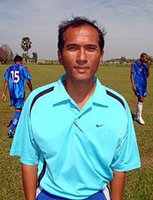 Tonight will see Cambodia take on the Group A hosts Indonesia in their second game of the round-robin group matches of the AFF 2008 Suzuki Cup, Southeast Asia's premier football tournament. If coach Prak Sovannara (right) thought the opening 5-nil defeat against Singapore was tough, then tonight's match will also put the young Cambodian team under severe pressure, not only do they have to contend with a rampant home side that beat Myanmar 3-0 in the opening game, but the vociferous home fans in the Gelora Bung Karno stadium will act as the proverbial 12th man too. Let's face it, Cambodia have no chance of success, especially if they maintain their 11-man defensive tactics that were the hallmark of their opening defeat. They didn't manage a shot on target throughout that game and for my money, I'd much rather see them take the game to the hosts and go down gallantly, rather than dourly defending their goal in the last third of the pitch for the whole game. A giantkilling act is not on the cards. Kick-off should be around 7.30pm and the match will be beamed by Star Sports. The man to watch out for in the Indonesian team is star striker Bambang Pamungkas who has a great strike-rate of 35 goals in 60 international appearances. He even has his own website.
Tonight will see Cambodia take on the Group A hosts Indonesia in their second game of the round-robin group matches of the AFF 2008 Suzuki Cup, Southeast Asia's premier football tournament. If coach Prak Sovannara (right) thought the opening 5-nil defeat against Singapore was tough, then tonight's match will also put the young Cambodian team under severe pressure, not only do they have to contend with a rampant home side that beat Myanmar 3-0 in the opening game, but the vociferous home fans in the Gelora Bung Karno stadium will act as the proverbial 12th man too. Let's face it, Cambodia have no chance of success, especially if they maintain their 11-man defensive tactics that were the hallmark of their opening defeat. They didn't manage a shot on target throughout that game and for my money, I'd much rather see them take the game to the hosts and go down gallantly, rather than dourly defending their goal in the last third of the pitch for the whole game. A giantkilling act is not on the cards. Kick-off should be around 7.30pm and the match will be beamed by Star Sports. The man to watch out for in the Indonesian team is star striker Bambang Pamungkas who has a great strike-rate of 35 goals in 60 international appearances. He even has his own website.
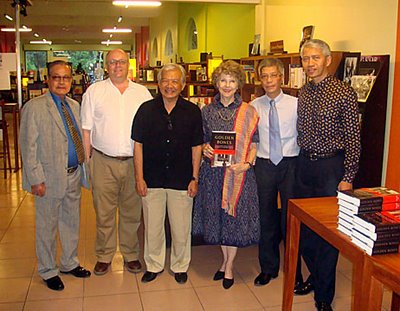 Guests at the book-signing: LtoR: General Dien Del, William Bagley (GM Monument Books), Prince Sisowath Sirirath, Martha Pattillo Siv, Roland Eng, Sichan Siv
Guests at the book-signing: LtoR: General Dien Del, William Bagley (GM Monument Books), Prince Sisowath Sirirath, Martha Pattillo Siv, Roland Eng, Sichan Siv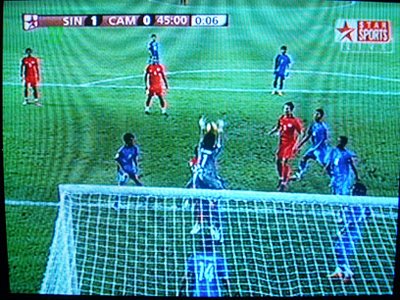 This was the moment, in time added-on at the end of the first-half, that Cambodia went behind after keeper Seiha dropped an innocuous cross
This was the moment, in time added-on at the end of the first-half, that Cambodia went behind after keeper Seiha dropped an innocuous cross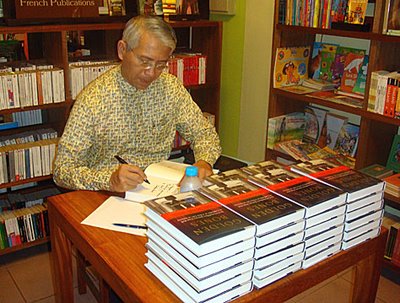 Sichan Siv signing copies of Golden Bones last week. A 2nd book-signing will take place at Monument Books tomorrow.
Sichan Siv signing copies of Golden Bones last week. A 2nd book-signing will take place at Monument Books tomorrow.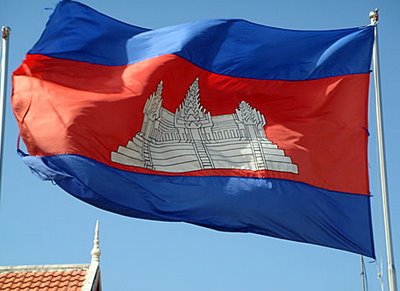 The butterflies are already building in the pit of my stomach as I wait for tonight's big kick-off. At 6pm Cambodia's national football team will open the AFF 2008 Suzuki Cup in Jakarta against the all-powerful Singapore team, hoping to pull off one of the shocks of the tournament. Well, I call them Singapore but half of the squad were born in distant countries around the globe and have ended up in Singapore to ply their trade on the international scene - but that's international sport for you these days, nothing is sacred, especially your nationality. These AFF championships are Southeast Asia's premier football event and the host nation for the Group A matches, Indonesia, are renowned for their fanatical fans, so despite the rain in Jakarta over the last few days, they are sure to whip up the atmosphere into a frenzy for the two opening games. Indonesia take on Myanmar straight after the Cambodia v Singapore opener. Keep up to speed with the Suzuki Cup here.
The butterflies are already building in the pit of my stomach as I wait for tonight's big kick-off. At 6pm Cambodia's national football team will open the AFF 2008 Suzuki Cup in Jakarta against the all-powerful Singapore team, hoping to pull off one of the shocks of the tournament. Well, I call them Singapore but half of the squad were born in distant countries around the globe and have ended up in Singapore to ply their trade on the international scene - but that's international sport for you these days, nothing is sacred, especially your nationality. These AFF championships are Southeast Asia's premier football event and the host nation for the Group A matches, Indonesia, are renowned for their fanatical fans, so despite the rain in Jakarta over the last few days, they are sure to whip up the atmosphere into a frenzy for the two opening games. Indonesia take on Myanmar straight after the Cambodia v Singapore opener. Keep up to speed with the Suzuki Cup here.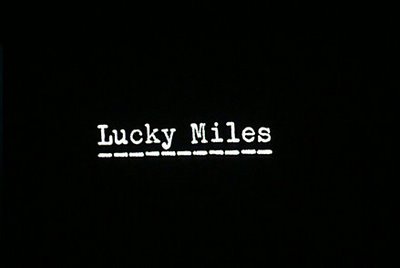 What nice people the Aussies are. Not only did they invite me to the opening gala for their first-ever Phnom Penh-based Australian Film Festival that began today but Australian Embassy First Secretary Fiona Cochaud who introduced the festival, was positively glowing about my blog. After drinks and snacks at ACE, and an appearance by Veng Sereyvuth, the Cambodian Senior Minister, we decamped to the Lux Cinema on Norodom Boulevard to watch the premiere showing of Lucky Miles, a comedy set in the remote and wild northern reaches of Australia where a group of asylum seekers are abandoned by smugglers and forced to journey into the unknown. The film has an opening sequence set in Phnom Penh in 1972 and its unlikely hero is Arun, a Cambodian who is determined to find his Aussie father in Perth. It's a pleasant film, not earth-shattering by any means but the photography was great, the landscape out of this world and the audience enjoyed it and so did I. The festival will feature 7 films over the next four days, all at Lux and all free to enter. I've been tipped the wink that 10 Canoes and The Dish are also well worth watching. When I told Fiona that The Red Sense - another Aussie film made by a Khmer director Tim Pek - will be part of the forthcoming CamboFest in Siem Reap, she was very pleased that another Aussie-Khmer collaboration will be getting its cinematic debut in Cambodia soon.
What nice people the Aussies are. Not only did they invite me to the opening gala for their first-ever Phnom Penh-based Australian Film Festival that began today but Australian Embassy First Secretary Fiona Cochaud who introduced the festival, was positively glowing about my blog. After drinks and snacks at ACE, and an appearance by Veng Sereyvuth, the Cambodian Senior Minister, we decamped to the Lux Cinema on Norodom Boulevard to watch the premiere showing of Lucky Miles, a comedy set in the remote and wild northern reaches of Australia where a group of asylum seekers are abandoned by smugglers and forced to journey into the unknown. The film has an opening sequence set in Phnom Penh in 1972 and its unlikely hero is Arun, a Cambodian who is determined to find his Aussie father in Perth. It's a pleasant film, not earth-shattering by any means but the photography was great, the landscape out of this world and the audience enjoyed it and so did I. The festival will feature 7 films over the next four days, all at Lux and all free to enter. I've been tipped the wink that 10 Canoes and The Dish are also well worth watching. When I told Fiona that The Red Sense - another Aussie film made by a Khmer director Tim Pek - will be part of the forthcoming CamboFest in Siem Reap, she was very pleased that another Aussie-Khmer collaboration will be getting its cinematic debut in Cambodia soon.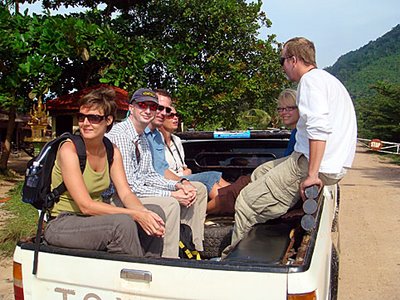 Waiting patiently at the gate to get into the Bokor National Park. Tim's the smug one wearing the cap.
Waiting patiently at the gate to get into the Bokor National Park. Tim's the smug one wearing the cap.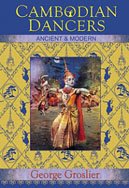 Helen Churchill Candee in his single-minded determination to recapture the beauty of Cambodia and the Khmer Empire in print. In 2009 we will see Cambodian Dancers: Ancient & Modern by George Groslier (right), as well as Daughters of Angkor Wat which will present analysis from his own Devata Database Project that suggests Angkor Wat is mankind's greatest tribute to womanhood. As I said, this man is passionate and his energy has been renewed by an incident that would've floored most people. In April, Kent lost a collection of 2,000 antique books, many of which are rare Southeast Asian histories dating back to the 1830s, when his home in Florida burnt to the ground. His enthusiasm is contagious and I'm really looking forward to not only the books in the pipeline but whatever else Kent gets involved in, there's literally no stopping him. Link: DatAsia
Helen Churchill Candee in his single-minded determination to recapture the beauty of Cambodia and the Khmer Empire in print. In 2009 we will see Cambodian Dancers: Ancient & Modern by George Groslier (right), as well as Daughters of Angkor Wat which will present analysis from his own Devata Database Project that suggests Angkor Wat is mankind's greatest tribute to womanhood. As I said, this man is passionate and his energy has been renewed by an incident that would've floored most people. In April, Kent lost a collection of 2,000 antique books, many of which are rare Southeast Asian histories dating back to the 1830s, when his home in Florida burnt to the ground. His enthusiasm is contagious and I'm really looking forward to not only the books in the pipeline but whatever else Kent gets involved in, there's literally no stopping him. Link: DatAsia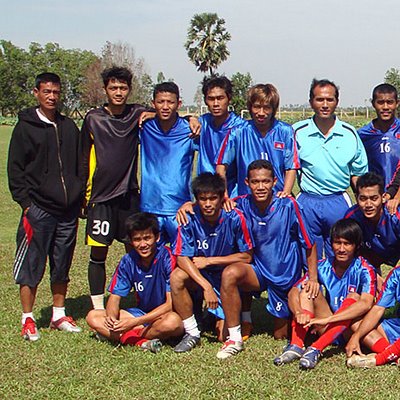 These are the players and coaches who will give their all in the red shirts (or blue) of Cambodia on Friday 5th December versus the cup favourites and holders Singapore, against co-hosts Indonesia on Sunday 7th and in their final AFF Suzuki Cup Group A match against Myanmar on Tuesday 9th, all of the matches being played in an 80,000 seat stadium in Jakarta. To get a win or draw against any of these teams will be an excellent achievement based on Cambodia's poor record in international competition. All three of them are ranked higher than Cambodia, who are currently at 174 in the FIFA World rankings, with Indonesia at 132, Singapore 126 and Myanmar 158. With so little preparation time, it will be a tough ask for Cambodia to achieve success, though the spirit and comraderie in the training camp was very evident on my visit on Monday morning and the team told me they will be doing their very best for their country. Come on Cambodia!
These are the players and coaches who will give their all in the red shirts (or blue) of Cambodia on Friday 5th December versus the cup favourites and holders Singapore, against co-hosts Indonesia on Sunday 7th and in their final AFF Suzuki Cup Group A match against Myanmar on Tuesday 9th, all of the matches being played in an 80,000 seat stadium in Jakarta. To get a win or draw against any of these teams will be an excellent achievement based on Cambodia's poor record in international competition. All three of them are ranked higher than Cambodia, who are currently at 174 in the FIFA World rankings, with Indonesia at 132, Singapore 126 and Myanmar 158. With so little preparation time, it will be a tough ask for Cambodia to achieve success, though the spirit and comraderie in the training camp was very evident on my visit on Monday morning and the team told me they will be doing their very best for their country. Come on Cambodia!